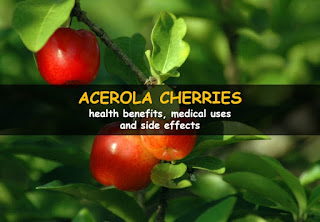Why do people take Acerola Cherry?
Acerola cherry is a plant that is native to tropical regions of the Western Hemisphere. It’s also commonly called the West Indies cherry, Barbados cherry, or just simply “acerola.” It’s believed that the shrub-like plant originated in southern Mexico and the Caribbean.
Acerola produces cherry-like berries, but it’s not a true cherry. These berries are pleasant-tasting and have been used in modern and folk medicine. Traditional uses include treatment for liver ailments, diarrhea, dysentery, coughs, and colds.
Recently, there has been interest in using acerola’s vitamin C content as a supplement. There are many health and wellness claims made about this supplement, but not all have research to back them up.
Why do people take acerola cherry?
Acerola is most well-known for being extremely rich in vitamin C. Because of this, it’s often used to help with or prevent colds or flu. It’s also used as an antioxidant nutrient. Together with vitamin C, acerola may be taken to boost immunity.
Similar to witch hazel, acerola cherry is an astringent. This could make it helpful for treating skin blemishes, promoting skin elasticity, and aiding digestive issues. It may even have use as an antimicrobial mouth wash.
Other uses of acerola include:
Consume the berry or fruit part of the acerola plant for its health benefits. Its taste tends to be described as sweet, fragrant, and astringent. It’s easily eaten raw or cooked into dishes.
The best way to get the fruit is to grow your own because of acerola cherry’s quick perishability. You can also preserve fresh acerola cherries by freezing them as soon as you pick them.
The fruit is most commonly found in supplement form. This is because the berry decomposes within five days of harvest, losing much of its nutrition. Even juices spoil easily, unless preservatives are added. Still, the best way to take acerola cherry is by eating the fruit. Supplements should not be your first choice.
Supplement forms include:
The powder supplement is quite popular. Made from dehydrated and powdered acerola cherry juice, this can be mixed into beverages, smoothies, juices, and more. You can also make smoothies from your frozen berries.
There is no clinical research to support a safe dose of acerola. It’s safe to say that you can follow guidelines of vitamin C supplementation when taking acerola at home. This is because this vitamin contributes the most to acerola’s nutritional content.
Recommendations may vary depending on the supplement product you buy. Follow dosage directions on the label if you’re uncertain of how much to take.
What are acerola’s proven benefits?
Acerola’s health benefits are mostly due to its richness in vitamin C. The more the fruit ripens, the more vitamin C is lost — and acerola ripens very quickly.
In a study of various vitamin C-containing fruits and their relative amounts, acerola outperformed all the rest, especially when grown organically. The fruit has reportedly higher amounts of vitamin C than even oranges and strawberries, and it’s only outdone by rosehips. The berry was also found to be a very significant source of vitamin A.
Vitamin C is a required nutrient and water-soluble vitamin and is not stored in the body, so you need to take a source of water-soluble vitamins in daily. Along with vitamin A, vitamin C is a known antioxidant, helping prevent free radical damage and certain illnesses. Recent studies affirm that acerola is quite antioxidant-rich.
Vitamin C also builds collagen, protects mucus membranes, and prevents scurvy. Vitamin C is important to keep the immune system functioning and help the body fight infections, viruses, and even cancer. While more research is needed, one study demonstrated that in the laboratory, cherries high in antioxidants and vitamin C had the ability to assist the body in stopping the growth of colon cancer.
Of all the research on acerola cherry, the studies that focus on vitamin C are the most thorough. This confirms its place as an all-natural vitamin C supplement, which may be used for cold and flu support. As for its other health benefits, more research is needed.
Acerola, when consumed as a food, also contains good amounts of the following nutrients:
It’s possible to take too much acerola cherry. As with a vitamin C supplement, if you take too much, you may experience digestive disturbances. To avoid problems or discomfort, take milligram doses of acerola much like you would any vitamin C supplement. If there are any supplement label directions, follow them. Keep in mind that supplements are not monitored for quality, purity, packing, or dosage by the Food and Drug Administration. Always choose supplements from a reputable manufacturer.
Don’t take large doses of any vitamin C product, and gradually decrease the amount if you are already taking large doses. Rebound scurvy can happen when the body has become accustomed to a larger dosage.
If you take too much, you may experience:
Very high amounts of acerola cherry over a long period of time may cause kidney stones. Contact your doctor immediately if you experience side or lower back pain, which could be a symptom.
If you grow an acerola cherry plant, there have been reports of contact dermatitis when harvesting. Otherwise, the berry is nontoxic and safe to consume.
Acerola is used as a home remedy for a variety of maladies. Research supporting it as a vitamin C source and natural supplement is strong. Acerola also contains other important vitamins and minerals, and it’s a significant source of antioxidants.
Consuming it as a food or supplement may help you meet your vitamin C needs. It could also be of great help during cold and flu season. As for its other claimed benefits — digestive aid, antidepressant, and athletic endurance, for example — no research is yet available, and more studies are needed to support these uses.
CREDIT: https://www.healthline.com
Acerola produces cherry-like berries, but it’s not a true cherry. These berries are pleasant-tasting and have been used in modern and folk medicine. Traditional uses include treatment for liver ailments, diarrhea, dysentery, coughs, and colds.
Recently, there has been interest in using acerola’s vitamin C content as a supplement. There are many health and wellness claims made about this supplement, but not all have research to back them up.
Why do people take acerola cherry?
Acerola is most well-known for being extremely rich in vitamin C. Because of this, it’s often used to help with or prevent colds or flu. It’s also used as an antioxidant nutrient. Together with vitamin C, acerola may be taken to boost immunity.
Similar to witch hazel, acerola cherry is an astringent. This could make it helpful for treating skin blemishes, promoting skin elasticity, and aiding digestive issues. It may even have use as an antimicrobial mouth wash.
Other uses of acerola include:
- antidepressant
- antifungal
- athletic endurance
- diarrhea
- dysentery
- skin astringent (cream)
Consume the berry or fruit part of the acerola plant for its health benefits. Its taste tends to be described as sweet, fragrant, and astringent. It’s easily eaten raw or cooked into dishes.
The best way to get the fruit is to grow your own because of acerola cherry’s quick perishability. You can also preserve fresh acerola cherries by freezing them as soon as you pick them.
The fruit is most commonly found in supplement form. This is because the berry decomposes within five days of harvest, losing much of its nutrition. Even juices spoil easily, unless preservatives are added. Still, the best way to take acerola cherry is by eating the fruit. Supplements should not be your first choice.
Supplement forms include:
- capsule
- chewable
- liquid extract (tincture)
- powder
The powder supplement is quite popular. Made from dehydrated and powdered acerola cherry juice, this can be mixed into beverages, smoothies, juices, and more. You can also make smoothies from your frozen berries.
There is no clinical research to support a safe dose of acerola. It’s safe to say that you can follow guidelines of vitamin C supplementation when taking acerola at home. This is because this vitamin contributes the most to acerola’s nutritional content.
Recommendations may vary depending on the supplement product you buy. Follow dosage directions on the label if you’re uncertain of how much to take.
What are acerola’s proven benefits?
Acerola’s health benefits are mostly due to its richness in vitamin C. The more the fruit ripens, the more vitamin C is lost — and acerola ripens very quickly.
In a study of various vitamin C-containing fruits and their relative amounts, acerola outperformed all the rest, especially when grown organically. The fruit has reportedly higher amounts of vitamin C than even oranges and strawberries, and it’s only outdone by rosehips. The berry was also found to be a very significant source of vitamin A.
Vitamin C is a required nutrient and water-soluble vitamin and is not stored in the body, so you need to take a source of water-soluble vitamins in daily. Along with vitamin A, vitamin C is a known antioxidant, helping prevent free radical damage and certain illnesses. Recent studies affirm that acerola is quite antioxidant-rich.
Vitamin C also builds collagen, protects mucus membranes, and prevents scurvy. Vitamin C is important to keep the immune system functioning and help the body fight infections, viruses, and even cancer. While more research is needed, one study demonstrated that in the laboratory, cherries high in antioxidants and vitamin C had the ability to assist the body in stopping the growth of colon cancer.
Of all the research on acerola cherry, the studies that focus on vitamin C are the most thorough. This confirms its place as an all-natural vitamin C supplement, which may be used for cold and flu support. As for its other health benefits, more research is needed.
Acerola, when consumed as a food, also contains good amounts of the following nutrients:
- calcium
- iron
- niacin (vitamin B-3)
- phosphorus
- riboflavin (vitamin B-2)
- thiamine (vitamin B-1)
It’s possible to take too much acerola cherry. As with a vitamin C supplement, if you take too much, you may experience digestive disturbances. To avoid problems or discomfort, take milligram doses of acerola much like you would any vitamin C supplement. If there are any supplement label directions, follow them. Keep in mind that supplements are not monitored for quality, purity, packing, or dosage by the Food and Drug Administration. Always choose supplements from a reputable manufacturer.
Don’t take large doses of any vitamin C product, and gradually decrease the amount if you are already taking large doses. Rebound scurvy can happen when the body has become accustomed to a larger dosage.
If you take too much, you may experience:
- diarrhea
- digestive cramps
- dizziness or fainting
- flushed appearance
- frequent urination
- headache (including migraine)
- nausea
- vomiting
Very high amounts of acerola cherry over a long period of time may cause kidney stones. Contact your doctor immediately if you experience side or lower back pain, which could be a symptom.
If you grow an acerola cherry plant, there have been reports of contact dermatitis when harvesting. Otherwise, the berry is nontoxic and safe to consume.
Acerola is used as a home remedy for a variety of maladies. Research supporting it as a vitamin C source and natural supplement is strong. Acerola also contains other important vitamins and minerals, and it’s a significant source of antioxidants.
Consuming it as a food or supplement may help you meet your vitamin C needs. It could also be of great help during cold and flu season. As for its other claimed benefits — digestive aid, antidepressant, and athletic endurance, for example — no research is yet available, and more studies are needed to support these uses.
CREDIT: https://www.healthline.com





Comments
Post a Comment